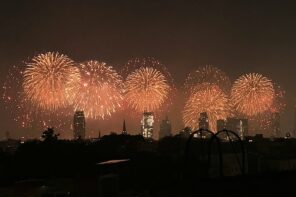Growing up Muslim in Southern California was never a problem for me—I felt no conflict between my religion and American culture. Sure, I was different in that I didn’t eat pork and (later, in high school) didn’t date or drink alcohol when my friends did; but we’re all different in some way, right? When I started fasting in high school during Ramadan, I had to explain to my friends what I was doing, and—although they didn’t quite understand it—they didn’t care unless it impinged on something they desired (“Why can’t you come on our hike? Can’t you have just a little water?“).
For Muslims, Ramadan is the month of fasting. Every morning, before dawn (not sunrise) we eat something light and then go without food or water until sunset. It’s meant to be difficult, but not dangerous; that’s why it’s required that we break the fast right at sunset and not try to impress anyone by fasting longer than we have to (and actually, by that time most of us are counting the minutes until we can have water).
Why do Muslims fast? It’s first-hand a demonstration of what it’s like for countless people in our world who go hungry and lack drinkable water on a daily basis. It also teaches us discipline over our bodily impulses and is meant to focus our thoughts on higher levels—God, charity, piety. Going willingly hungry is a constant reminder that we are trying to better ourselves. During Ramadan, Muslims are also required (if they are able) to give extra charity and to feed others.
Most religions prescribe some sort of fasting, such as at Lent and Yom Kippur. The connection between fasting and piety has been long acknowledged. Most fasting allows water, it’s true; but the lack of water is what makes the Ramadan fast an achievement for Muslims. And it’s only for healthy adults—those who are ill, pregnant, traveling, nursing a baby, menstruating, or elderly are excused from fasting.
At the end of the month of Ramadan is Eid ul-Fitr, or “Festival of the Fast-Breaking.“ Like most holidays, it involves a lot of eating and sharing food (especially after a month of hunger!). The children get presents and those who can afford them wear new clothes with one old piece inside (socks, maybe) to keep them humble. It’s the most important holiday of the year for Muslims, equivalent to Christmas or Easter.
It saddens me, therefore, that a holiday and fasting month that inspires Muslims to do good things provokes a volatile reaction in a country that prides itself on religious freedom.
In Tennessee, many of the Muslim workers (who comprise over half of the work force at the plant) asked to take the day off on Eid, making operation of the plant difficult. Tyson, therefore, decided to give the workers Eid as a paid holiday instead of Labor Day. Surprisingly, this ignited furor and bigotry in the community, which saw Tyson’s move as “un-American.“ Yet, as Kim Bobo points out, federal law requires employers to accommodate the religious beliefs of workers, unless it’s a hardship for the employers.
Does the community consider federal law un-American? Is it such a crime to allow people to celebrate a holiday, which for them is on a par with Christmas? Most Americans take for granted their right to get the day off on Christmas.
In Colorado, a meatpacking plant fired Muslim workers (mostly Somali immigrants) who walked off the job when the company refused to allow them time to break their Ramadan fasts and pray. The union representing the workers plans to fight the firings, asserting that the workers were not given enough time to come back to work. According to the L.A. Times one worker noted that “supervisors had shut off water fountains Friday evening to prevent Muslim workers from having their traditional drink to break the fast, and in one case a supervisor grabbed an employee by the neck, yanking him from his prayers.“
I was shocked when I read this. My first thought was, It’s not just a “traditional drink.“ People who have gone without water all day need to drink as soon as they can. It’s cruel and unhealthy to prevent them. Moreover, the Muslim sunset prayer takes only three or four minutes. It’s hard to believe that a five-to-ten minute break at sunset for plant workers is a hardship for the employer.
The non-Muslim workers at the plant in Colorado, as well as the community in Tennessee, in giving vent to their anti-immigrant and anti-Islam feelings have missed an important point: whatever their personal sentiments about immigrants or other religions, this country prides itself on freedom of religion. Islam is not incompatible with American values. The Pew Research Center has found that American Muslims are mostly middle-class and mainstream; Islam is one of many American faiths.
During the Ramadan that fell in December of 2001, Pope John Paul II urged Christians to fast for one day in solidarity with Muslims. I was so moved that I felt a rush of gratitude and awe. The “solidarity fast“ was evidence that, instead of using Ramadan—a holiday that reminds us to empathize with others—to instigate fear and hatred, we could use it, as the Pope did, to build multicultural bridges. That’s the real point that’s been missed this Ramadan, seven years later, in Tennessee and Colorado.




